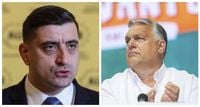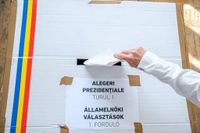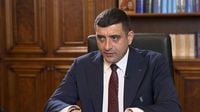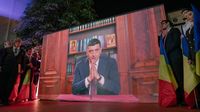Romania is on the brink of a significant political shift as George Simion, leader of the ultranationalist Alliance for the Union of Romanians (AUR), has emerged as a frontrunner in the presidential race. Following a landslide first-round victory with 41% of the votes on May 4, 2025, Simion's rise reflects a broader populist wave sweeping across Europe, driven by dissatisfaction with the political establishment and economic stagnation.
Simion's journey to prominence has been marked by controversy and a series of polarizing statements. He openly admitted to lying about affordable housing plans, claiming he would transform Romania into a state reminiscent of Viktor Orban's Hungary. "It was our form of marketing, promotion, media coverage. If we didn’t have these forms of promotion to break the information blockade, we wouldn’t be where we are today, with 42% of the votes," Simion stated, highlighting his unorthodox campaign strategy.
His political ascent comes in the wake of the December 2024 annulment of Romania's presidential elections, which was purportedly due to alleged Russian interference. This event has fueled a surge of support for Simion, as many Romanians feel disillusioned by the political status quo. The resignation of Prime Minister Marcel Ciolacu, who declared that the ruling coalition "lacks any credibility," further illustrates the turmoil within Romania's political landscape.
Simion's AUR party, founded only in 2019, has rapidly gained traction among voters who are frustrated with the perceived failures of the traditional parties, particularly the Social Democratic Party (PSD). Voters like Georgeta Toader, a 55-year-old from a rural town, have shifted their allegiance to Simion, expressing a desire for radical change after years of disappointment. "The people have awoken!" she exclaimed, emphasizing the growing sentiment among rural voters.
In the first round of voting, Simion not only captured a significant share of the domestic vote but also garnered 61% of the diaspora vote, indicating a widespread desire for change among Romanians living abroad. Many in the diaspora feel disconnected from the political developments at home and are eager for a leader who promises to prioritize their interests.
Simion's campaign is characterized by a strong nationalist rhetoric, and he has not shied away from aligning himself with far-right figures, including Hungary's Orban. He has referred to his party as "Trumpist" and has pledged to increase Romania's NATO spending, positioning himself as a staunch ally of the United States. "We want to be, along with Poland and the Baltic states, the eastern flank of NATO," he stated, underscoring his commitment to military strength.
However, Simion's rise has not been without its critics. His opponents, including Nicușor Dan, the mayor of Bucharest, have raised concerns about his authoritarian tendencies and the potential for his leadership to undermine democratic norms. Dan, who received only 21% of the vote in the first round, has a strong pro-Ukraine stance, contrasting sharply with Simion's more ambiguous position on Romania's support for Ukraine amidst the ongoing conflict with Russia.
During a recent debate, Simion attempted to present himself as a "Euro-realist," emphasizing his desire for a Europe of nations while simultaneously downplaying accusations of being pro-Russian. He has stated, "Our position towards the Russian war is very clear. It's a Russian war against Ukraine, against all international treaties," while also expressing concerns over the treatment of the Romanian minority in Ukraine.
Despite his populist appeal, Simion's lack of political experience and educational background has raised eyebrows. Critics have pointed to his clumsy speech and ideological incoherence as potential liabilities. Simion, who once boasted of his disdain for formal education, faced significant pressure during a recent debate against Dan, revealing gaps in his knowledge and preparedness.
As the second round of voting approaches on May 18, 2025, the stakes are high. Simion's supporters believe that his victory could signal a new era for Romania, one that prioritizes national interests over external pressures from the EU or NATO. However, the political establishment remains wary of his intentions, fearing that his presidency could lead to a consolidation of power reminiscent of Orban's Hungary.
In the streets of Bucharest, opinions on Simion are divided. Some, like Ștefan, an older man shopping at a local market, express a desire for strong leadership akin to historical figures like Vlad the Impaler. Others, like Florentina, a young coffee shop owner, voice concerns about the potential return of extremist policies should Simion win. "If Simion wins, I will move to Spain," she remarked, reflecting the anxieties of many who fear a regression in Romania's democratic values.
Simion's campaign has also tapped into a broader narrative of discontent with the EU, with many Romanians feeling that their country has not received its fair share of attention or resources. His supporters argue that the EU establishment is "corrupt, greedy and in many ways shady," and they are eager for a leader who promises to prioritize Romania's interests.
As Romania approaches this critical juncture, the outcome of the presidential election could have far-reaching implications not only for the country but for the entire region. With populist movements gaining ground across Europe, Simion's potential presidency may signify a shift toward a more nationalist and isolationist stance, challenging the established political order.
In conclusion, George Simion's rise to prominence in Romanian politics is emblematic of a larger trend of populism and nationalism that is reshaping the political landscape in Europe. As the election date draws near, all eyes will be on Romania to see if the discontent of the electorate translates into a decisive victory for Simion, potentially altering the course of the nation for years to come.




